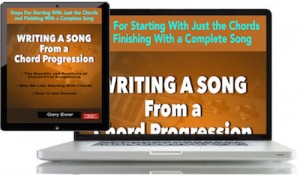I don’t want to give the impression that how schools approach the learning of a subject is always the best way forward. Sometimes it seems that schools are high on delivering course outlines and a bit scant on practical guidance.
If you’re at school to learn history or business administration, that approach of starting with a course outline, teaching the materials, and then administering tests and exams along the way is going to work.
 If you like starting songs by working out the chord progression first, you will love “Writing a Song From a Chord Progression.” It’s part of the 10-eBook “Essential Secrets of Songwriting” Bundle.
If you like starting songs by working out the chord progression first, you will love “Writing a Song From a Chord Progression.” It’s part of the 10-eBook “Essential Secrets of Songwriting” Bundle.
But instruction in music absolutely needs a good dose of the practical. By practical, I mean adding to the objective materials of a course by adding real, in-person experiences of writing, playing and listening to music.
Most music schools are a lot heavier on the practical side of music instruction than they were a few decades ago. In the 1970s, your coursework would be awash with the theory and history of music, but light on the practical side. The attitude was, “If you just want to play music, quit school and play.” Thankfully today, music schools know that there is much to be learned from a good mix of the practical with the theoretical side.
Developing Your Own Personal “Songwriter’s Course”
If you’re working at becoming a better songwriter, there is a way in which you can borrow the best practices of a music school’s approach to learning, and applying it to your own method of learning. I think you’ll like the result.
Here are five things, for example, that you need to be doing if you were learning songwriting the way today’s composers are learning composition in most university music programs:
- Keep improving your playing skills. Playing keeps songwriting relevant. It also helps you come up with good musical ideas as your fingers learn new patterns and new ways of playing.
- Learn music theory, and apply it. Sure, the learning of music theory would seem to be an obvious part of any music program. But it’s the “apply it” bit that so many musicians forget. Applying your knowledge of theory means that once you’ve learned something, listen to music and try to find the ways in which songwriters have used that bit of theory. Again, relevance is the key issue.
- Learn the history of songwriting. History is important, because at one point, no matter how old a song is, that song was new – it was what new music sounded like. When Buddy Holly’s “Peggy Sue” (Jerry Allison, Norman Petty) was heard for the first time, it was fresh and cutting-edge: it was the world’s newest song. You need to learn what makes that song special, and why we’re still listening to it more than 60 years later.
- Develop your ear. One of the best ways to develop your ear is to transcribe music. Get your guitar out, or sit at your keyboard, and find the chords and melodic patterns that you’re hearing as you listen to other people’s songs. Also, developing your ear has a lot to do with your ability to sing in tune. There are lots of free online courses, but even if you spend a bit of money, it’s usually money well-spent.
- Listen every day. It would be unthinkable in a university setting to teach music without actually listening to it — a lot! The more you listen, the clearer the picture you get regarding what good music is.
There is no one bit of music instruction that’s more important than another. All of it together will not only make you a more rounded, polished songwriter, but it will speed up your songwriting process, and make it more likely that you can discuss good songwriting intelligently with other songwriters.
 Written by Gary Ewer. Follow on Twitter.
Written by Gary Ewer. Follow on Twitter.
 “The Essential Secrets of Songwriting 10-eBook Bundle” covers every aspect of how to write great songs. Contains a Study Guide that keeps you focused on becoming a consistently better songwriter. Get today’s FREE DEAL when you make your purchase. Click below for details.
“The Essential Secrets of Songwriting 10-eBook Bundle” covers every aspect of how to write great songs. Contains a Study Guide that keeps you focused on becoming a consistently better songwriter. Get today’s FREE DEAL when you make your purchase. Click below for details.










